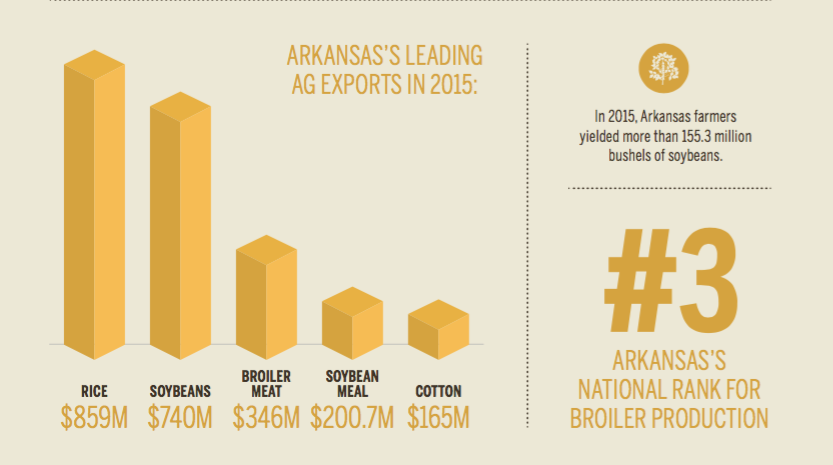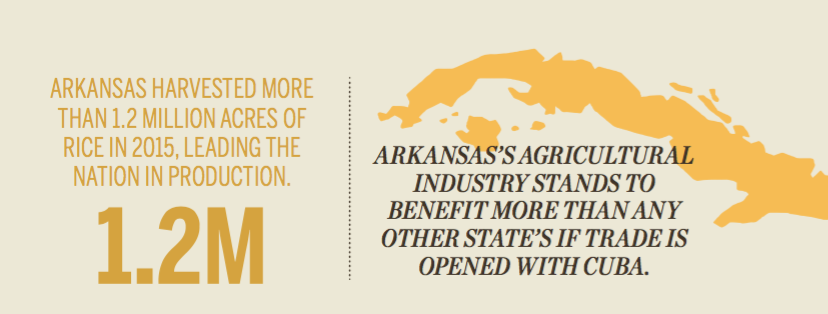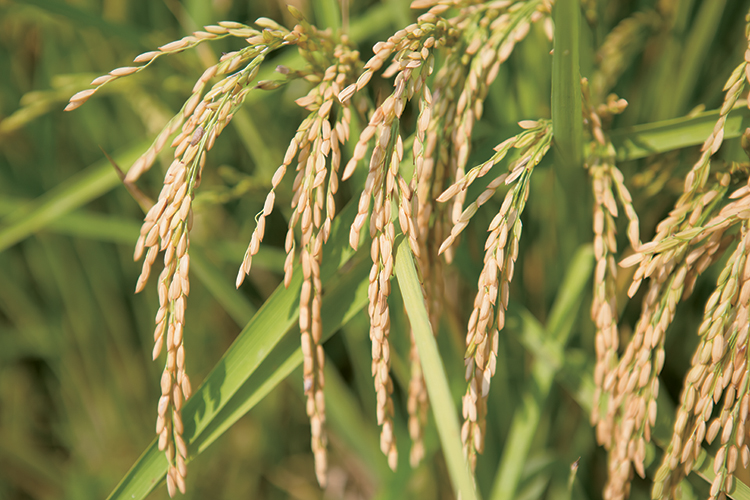Home > Arkansas > Arkansas Crops & Livestock > Trade is Opening Doors
Trade is Opening Doors
 Political change is soybeans, are in demand in Cuba. working to put Arkansas at the underway between the “As the nation’s No. 1 producer of forefront of future trade U.S. and Cuba, and now rice and No. 3 producer of poultry, opportunities with Cuba,” he adds. it’s time to engage in Arkansas’s agriculture industry has Secretary of Agriculture Wes agricultural trade with the country, much to gain from opening trade Ward, who has participated in two say some Arkansas lawmakers. Arkansas Gov. Asa Hutchinson, the first governor to visit Cuba after the embassy in Havana was reopened in 2016, promoted Arkansas agriculture while there.
Political change is soybeans, are in demand in Cuba. working to put Arkansas at the underway between the “As the nation’s No. 1 producer of forefront of future trade U.S. and Cuba, and now rice and No. 3 producer of poultry, opportunities with Cuba,” he adds. it’s time to engage in Arkansas’s agriculture industry has Secretary of Agriculture Wes agricultural trade with the country, much to gain from opening trade Ward, who has participated in two say some Arkansas lawmakers. Arkansas Gov. Asa Hutchinson, the first governor to visit Cuba after the embassy in Havana was reopened in 2016, promoted Arkansas agriculture while there.
The reason: opening a market in Cuba would have big benefits for Arkansas farmers. Arkansas’s top exports, including rice, corn and markets with Cuba,” Hutchinson says. “It’s an untapped market of 11 million people who enjoy the products we have to offer, which would yield tremendous benefits for our farmers and our state’s economy.
“While Congress takes a closer look at our nation’s policy on credit extension flexibility, I will continue trade missions to Cuba to promote Arkansas agriculture, accompanied the governor on his trip.
 Big Benefits
Big Benefits
On board with lifting trade restrictions is U.S. Rep. Rick Crawford from Arkansas, who has been advocating for an embargo lift for more than 15 years. In fact, Crawford introduced the Cuba Agricultural Exports Act in order to lift finance and marketing restrictions to allow U.S. agricultural products into Cuba.
“Arkansas stands to benefit probably more immediately and more so than any other state,” he says. “In general, the whole ag industry stands to benefit.”
Cuba imports 80 percent of its food, Crawford says, with rice primarily imported from Vietnam. But the U.S. could provide a supply. Arkansas’s high production would make it a key player in rice exports to Cuba. In fact, half the nation’s rice crop is produced right in Crawford’s own district.
Cuba is also expected to have an increased demand for chicken and other types of meat. The country’s economy is improving due to increased tourism, infrastructure improvements and other future development, Crawford says.
He notes that today’s political climate surrounding U.S. and Cuban political relations is shifting. The embargo, he says, has resulted in little good for both countries. Plus, the embargo has denied U.S. agricultural producers and others from financially benefiting from trade.
 “Essentially, what we’ve been doing for the last 55 years is viewing our relationship with Cuba through the lens of the Cold War, and the Soviet-era Cold War is over,” he says. “There is an economic void that needs to be filled in Cuba. The United States can play a vital leadership role in that regard. I think we should.”
“Essentially, what we’ve been doing for the last 55 years is viewing our relationship with Cuba through the lens of the Cold War, and the Soviet-era Cold War is over,” he says. “There is an economic void that needs to be filled in Cuba. The United States can play a vital leadership role in that regard. I think we should.”
Plus, he adds, if the U.S. doesn’t fill that void, then other nations will. And taking on that role would help strengthen national security.
“I think the conditions are ideal now to take an incremental approach to retool our posture with Cuba,” Crawford says.
Another Arkansas lawmaker pushing for change is U.S. Sen. John Boozman, who has also been a longtime advocate for lifting trade restrictions. Along with Sen. Jon Tester of Montana, Boozman introduced an amendment to the Senate Fiscal Year 2017 Financial Services and General Government Appropriations bill to lift the ban on private banks and companies offering credit for export of ag commodities to Cuba. The amendment was approved by the committee.
“I feel strongly that we should start trading with Cuba. That would be good for the Cuban people and the United States, as well as the people of Arkansas,” Boozman says. “Traditionally, the Cuban people have eaten a lot of rice and poultry, commodities that Arkansas does a very good job of producing.”

About his amendment, Boozman says, “It would allow banks and individuals to provide financing if they want to trade with Americans. Currently, they can’t do that. There would be no obligation to the government, but if individuals want to trade with Cubans, they can.”
According to Boozman, state farm organizations and individual farmers are voicing support to open the door for trade. About 40 percent of crops in Arkansas are exported, Boozman notes, so “we’re always looking for new markets.”
“Certainly, the Cuban market would be very beneficial for Arkansas,” he says.



